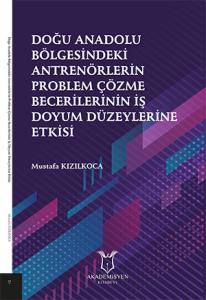Doğu Anadolu Bölgesindeki Antrenörlerin Problem Çözme Becerilerinin İş Doyum Düzeylerine Etkisi
Özet
Bu kitap, Doğu Anadolu Bölgesi'ndeki antrenörlerin problem çözme becerilerinin iş doyum düzeylerine etkisini incelemektedir. İş doyumu, bireyin işiyle ilgili duyduğu memnuniyet ve tatmin düzeyini ifade eder. İş doyumu, birey, örgüt ve yönetici açısından önemlidir. İş doyumunu etkileyen teoriler arasında Maslow'un ihtiyaçlar hiyerarşisi, Herzberg'in çift faktör teorisi, McClelland'ın başarma ihtiyacı kuramı ve Alderfer'in VİG (ERG) kuramı bulunmaktadır. Süreç teorileri arasında ise Adams'ın eşitlik teorisi, Vroom'un beklenti teorisi, Lawler ve Porter'ın (geliştirilmiş) beklenti teorisi ve Locke'un amaç teorisi yer almaktadır. İş doyumunu etkileyen faktörler arasında bireysel faktörler, yaş, cinsiyet ve eğitim düzeyi bulunmaktadır. Bu kitap, Doğu Anadolu Bölgesi'ndeki antrenörlerin problem çözme becerilerinin iş doyum düzeylerine olan etkisini araştırmaktadır.
This book examines the impact of problem-solving skills of coaches in the Eastern Anatolia Region on their job satisfaction levels. Job satisfaction refers to the level of satisfaction and fulfillment an individual experiences in relation to their job. Job satisfaction is important from the perspective of the individual, organization, and manager. The theories that influence job satisfaction include Maslow's hierarchy of needs, Herzberg's two-factor theory, McClelland's achievement motivation theory, and Alderfer's ERG theory. Among the process theories, Adams' equity theory, Vroom's expectancy theory, Lawler and Porter's (enhanced) expectancy theory, and Locke's goal theory are included. Factors that affect job satisfaction include individual factors, age, gender, and education level. This book investigates the impact of problem-solving skills of coaches in the Eastern Anatolia Region on their job satisfaction levels.

Yayınlanan
Lisans
LisansBu İnternet Sitesi içeriğinde yer alan tüm eserler (yazı, resim, görüntü, fotoğraf, video, müzik vb.) Akademisyen Kitabevine ait olup, 5846 sayılı Fikir ve Sanat Eserleri Kanunu ve 5237 sayılı Türk Ceca Kanunu kapsamında korunmaktadır. Bu hakları ihlal eden kişiler, 5846 sayılı Fikir ve Sanat eserleri Kanunu ve 5237 sayılı Türk Ceza Kanununda yer alan hukuki ve cezai yaptırımlara tabi olurlar. Yayınevi ilgili yasal yollara başvurma hakkına sahiptir.
